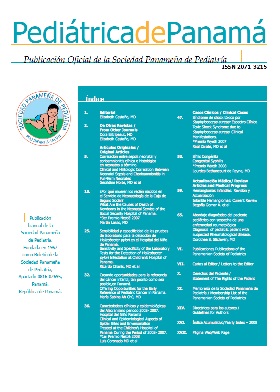Acute hepatitis of unknown origin. A series of probable cases seen in a pediatric referral hospital in Panama
Authors
DOI:
https://doi.org/10.37980/im.journal.rspp.20232194Keywords:
acute hepatitis, unknown origin, adenovirus, pediatrics, COVID-19Abstract
Introduction: During the year 2022 an increase in cases of hepatitis of unknown origin was observed in the pediatric population. Its etiology has not yet been clarified. This study aims to present the clinical and laboratory results of patients with hepatitis treated at the Hospital del Niño Dr. José Renán Esquivel during the year 2022.
Material and methods: Descriptive study of 10 pediatric patients with criteria of acute hepatitis of unknown origin seen in our center during the year 2022. An analysis of the main clinical, analytical, demographic, vaccination and serological variables was carried out.
Results: The final sample consisted of 10 patients, with a mean age of 2.8 years. The predominant clinical manifestations were jaundice, fever and gastrointestinal symptoms. Laboratory tests showed increased levels of transaminases and bilirubin. Only one patient had a history of vaccination for SARS-CoV-2. The main etiological agent identified was adenovirus, found in 40% of the patients studied.
Conclusions: Pediatricians should consider the diagnosis of acute hepatitis of unknown origin in patients with jaundice and fever, which may be associated with vomiting, diarrhea, hepatomegaly, abdominal pain and choluria, among others. Elevated transaminases (>500 U/L of AST or ALT) and bilirubin should increase the index of suspicion. Although the main etiological agent to date seems to be related to adenovirus, further studies are needed to confirm this hypothesis.
Downloads
Additional Files
Published
Issue
Section
License
Copyright (c) 2023 Infomedic Intl.Derechos autoriales y de reproducibilidad. La Revista Pediátrica de Panamá es un ente académico, sin fines de lucro, que forma parte de la Sociedad Panameña de Pediatría. Sus publicaciones son de tipo gratuito, para uso individual y académico. El autor, al publicar en la Revista otorga sus derechos permanente para que su contenido sea editado por la Sociedad y distribuido Infomedic International bajo la Licencia de uso de distribución. Las polítcas de distribución dependerán del tipo de envío seleccionado por el autor.






